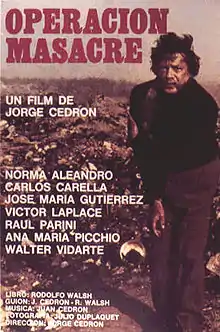Operación Masacre (film)
Operación Masacre (transl. "Operation Massacre") is a 1973 historical drama film co-written and directed by Jorge Cedrón and based on the nonfiction book of the same name by Rodolfo Walsh,[1] who also wrote the script. It stars Norma Aleandro, Víctor Laplace, Ana María Picchio, Walter Vidarte and Julio Troxler. It was filmed clandestinely (in hiding) during the self-styled "Argentine Revolution" dictatorship (1966–1973), and finally released on September 27, 1973.[2]
| Operación Masacre | |
|---|---|
 Theatrical release poster | |
| Directed by | Jorge Cedrón |
| Screenplay by |
|
| Based on | Operación Masacre by Rodolfo Walsh |
| Produced by | Oscar Daunes Jorge Cedron |
| Starring | |
| Narrated by | Julio Troxler |
| Cinematography | Julio Duplaquet |
| Edited by | Miguel Pérez |
| Music by | Juan Carlos Cedrón |
Release date |
|
Running time | 115 minutes |
| Country | Argentina |
| Language | Castilian Spanish |
Synopsis
In 1956, one year after the self-styled "Liberating Revolution" dictatorship deposed Argentine president Juan Perón in a coup, a civil-military insurrection failed in its attempt to take on the power in the name of peronism.[3] In retaliation, in a vacant lot in the city of José León Suárez (province of Buenos Aires), several civilians accused of being part of the uprising are illegally shot by the dictatorship.[4] However, seven people manage to survive and tell their story to the world.
Cast
- Norma Aleandro - Berta Figueroa de Carranza
- Carlos Carella - Nicolás Carranza
- José María Gutiérrez - Norberto Gabino
- Víctor Laplace - Carlos Lizaso
- Raúl Parini - Police commissioner Rodríguez Moreno
- Ana María Picchio
- Walter Vidarte - Juan Carlos
- Zulema Katz - Florinda
- Julio Troxler - Himself
- Blanca Lagrotta - Pilar de Di Chiano
- Luis Barrón
- Miguel Narciso Bruse - Horacio Di Chiano
- Fernando "Tacholas" Iglesias - Guard
- Fernando Labat - Police commissioner Penas
- Carlos Antón
- Jorge de la Riestra - Lieutenant colonel Desiderio A. Fernández Suárez
- Enrique Alonso
- Julio Di Palma - Gordo Rodríguez
- Pachi Armas - Police officer Shorthand 1
- Hedy Crilla
- José Arriola
- Luis Barrón
- Leonardo Belin
- Raúl Bobbio
- Sara Bonet
- Rodolfo Brindisi - Prisoner
- Oscar Calvo
- Oscar Canoura
- María Cignacco
- Hubert Copello
- Martín Coria - Police officer taking a statement
- Héctor Dangelo
- Samuel Desse
- David Di Napoli
- Óscar Ferreiro - Juan Carlos Torres
- Mario Fogo
- Susana Langan
- Modesto López
- Luis Martínez Rusconi
- Pedro Martínez
- Manuel Mendel
- Rodolfo Morandi
- Edgardo Nervi
- Norberto Pagani
- Rodolfo Relman
- Luis Rondini
- Héctor Sajón
- Enrique Scope
- David Socco
- Guillermo Sosa
- Pepe Sterrantino
- Hugo Álvarez - Francisco Garibotti
- Mario Pinasco
References
- Stites Mor, Jessica (2012). Transition Cinema : Political Filmmaking and the Argentine Left Since 1968. Pittsburgh: University of Pittsburgh Press. p. 63. ISBN 978-0-8229-7797-1.
- Jones, Derek (2015). Censorship : A World Encyclopedia. Hoboken: Taylor and Francis. p. 431. ISBN 978-1-136-79864-1.
- Tompkins, Cynthia (2018). Affectual Erasure : Representations of Indigenous Peoples in Argentine Cinema. Albany: State University of New York Press. p. 81. ISBN 978-1-4384-7098-6.
- Walsh, Rodolfo J; Gitlin, Daniella (2013). Operation Massacre. New York: Seven Stories Press. p. 193. ISBN 978-1-60980-513-5.